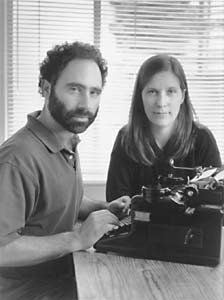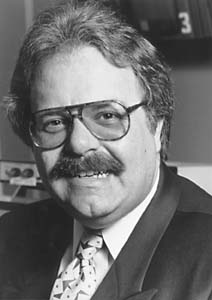Press Corp.
Photo by Kirk Schroeder
This program was almost made impossible by lack of support from the following spineless, centrist, money-hungry organizations ...
By Michael Learmonth
WHEN BERKELEY FILMMAKERS Randy Baker and Beth Sanders set out to document how big money influences the media, they made a critical tactical mistake. If they assiduously challenged the most trusted names in the media, as well as the Westinghouses, the General Electrics and the Coca-Colas who sponsor them, who would be left to air their work?
After being turned away by two heavy-hitting PBS stations, they found KTEH, a small television station building an impressive track record of supporting a lively community of independents, right here in San Jose.
The fruits of their labor, a film titled Fear and Favor in the Newsroom, premieres Monday night at 10pm on Channel 54. The documentary explores recent cases in which corporate interests have shaped what gets covered in newspapers, in such unexpected places as The New York Times and the San Jose Mercury News, as well as on the major television networks and PBS.
Fear and Favor's producers experienced firsthand the kind of commercial pressures that keep important programming off the air when they found their topic was too hot a potato for even some of the larger PBS stations to handle.
In searching for a sponsor for their film, Sanders and Baker first went to WTTW in Chicago, which broadcast their previous documentary, Making the News Fit, winner of a local Emmy. But that was before the Gingrich squeeze on federal funding for PBS. This time around, the station's producers weren't interested. Then Baker and Sanders took a rough cut of their film to KQED in San Francisco, where a producer there watched the film, promised to consider it and never called back.
Finally they came to San Jose's KTEH, whose series video i has been supporting and premiering independent documentaries for three years. The brainchild of KTEH president and CEO Tom Fanella, the series has premiered some of the most influential recent documentaries--such as The Day After Trinity, Vietnam: At the Crossroads and When Abortion Was Illegal--at a time when most public television stations are playing it safe.
"We've felt strongly for a long time that independent film and video makers are underrepresented," Fanella says. "This area is a hotbed of independents."
IN THE DOCUMENTARY, Baker and Sanders recall an obvious example of corporate squeezes of newspapers in the great automobile-dealer boycott of the Mercury News in May 1994. Reporter Mark Schwanhausser had just written a story for the business section headlined "A Car Buyer's Guide to Sanity." It was the kind of "news you can use" story that editors love. Intended to demystify the sometimes angst-filled process of buying a new car, it offered advice that portrayed dealers as Shylocks in expensive suits.
Soon after that edition rolled off the presses, Mercury News publisher Jay Harris had a crisis on his hands. Local auto dealers were pissed, saying the article unfairly portrayed them as dishonest. They banded together and withdrew 52 pages of advertising the first week after the story was published. About $1 million in lost advertising later, the Mercury News took out a full-page ad in its own newspaper spelling out the "top 10 reasons you should buy or lease your next car from a factory-authorized dealer." With the dealers sufficiently appeased, the advertising dollars returned.
Newspaper executives say businesses have as much right to protest the content of the newspaper as any other reader. But the boycott raised a disturbing question: Would the incident taint Mercury News coverage of the auto industry in the future? Or how about coverage of the real estate industry, which is also well organized and a heavy consumer of newspaper ad space?
"On some level, there has been a chill," admits Schwanhausser, still a reporter at the Mercury. "But I don't think we've lost our will entirely. I don't feel that we are a newspaper that is cowering."
Rebecca Smith, another Mercury News reporter, covered the aftermath of the boycott. She thinks the Merc's openness in dealing with the problem reflects well on the paper.
"Newspapers don't always talk about what happens in the newsroom," she says. "The Mercury News is different. We were pretty open with readers."
The lesson learned from the incident, Smith says, is that at the very least, stories about the auto industry are approached with more care and trepidation than in the past. She points out that in spite of the boycott, Schwanhausser wasn't taken off the automotive beat and recently wrote an extensive story on auto leasing.
"I think there is more scrutiny of stories on the part of editors," she concedes. "But I don't think we've shrunk from stories we should have done because of the boycott."
BUT SOMETIMES commercial pressures come from within. The documentary investigates a brouhaha in Atlanta that began, ironically, when the Atlanta Journal and Constitution published a series that won a Pulitzer Prize in 1986. The series revealed that African Americans were five times less likely to be approved for bank loans in Atlanta than whites of equal financial status. This, and an article reporting on a grand jury investigation of Atlanta-based Coca-Cola, rankled bank executives on the AJC's own board, as well as a number of directors who sat on both the board of the paper and the board of Coca-Cola simultaneously. Soon after, AJC editor Bill Kovach resigned.
The documentary also looks at boosterish coverage of the Persian Gulf War by networks that are owned by major defense industry contractors like Westinghouse (CBS) and General Electric (NBC). But the documentary points out that even the so-called noncommercial Public Broadcasting System (PBS) relies increasingly on corporate support for programming and encourages a centrist perspective. A former producer for the "MacNeil/Lehrer NewsHour" shows how selected footage was cut from his report that investigated safety issues on a proposed nuclear waste dump in Needles, Calif., to make protesters appear shrill and fanatical, while eliminating footage of bulldozers burying yellow barrels of toxic waste.
"Public television is averse to any systematic look at the role of money and corporations in politics," Baker says, explaining the penchant for cooking shows and "culturally affirming documentaries." "Producers basically told us, 'This is political and things are getting tight.' "
Things got "tight" when Gingrich and his freshman class stormed to power in Congress in 1994 with the goal of ending all federal funding for public broadcasting. While their efforts thus far have been thwarted, PBS stations anticipate even greater reliance in the future on the interminable pledge drives and, yes, corporate sponsors.
TOM FANELLA'S ground-floor office at KTEH, across the train tracks from the Mercury News' campus, is appointed in darkly stained wood. The faint fog of a cigar lingers in the room. Fanella, with a handlebar mustache and wide-set eyes, compulsively rubs a smoothly polished baseball as he explains his decision to air Fear and Favor.
"To this point, we have not accepted underwriting for the series," he says, forming a split-finger grip across the laces. "I don't know if that is the right suggestion to have on the air. But if we could get foundation money for it, that would be different."
Sixty percent of KTEH's funding comes from viewers who, hoping to avoid the pitfalls of commercial television, become members of the station. Fanella says the diversity of funding sources is important. "It gives us the broad-based financial support that you ought to have if you're going to tweak establishment noses," he explains. "Every now and then we're lucky enough to get something like Fear and Favor, which really stirs the pot."
But would KTEH come out as well as the Mercury News if corporate sponsors decided Fear and Favor warranted a boycott?
"I hope it doesn't chill the corporate-support climate," understates Fanella. "I don't think it is an anti-corporate program. I think it says a lot about the way journalism is practiced today."
Baker and Sanders know their work puts them at odds with the big-money media. Fortunately, some television stations are still willing to take the risk with them. Sanders says many of the original funders of the project have since stopped supporting projects like Fear and Favor. "We're not sure we could do this documentary if we started today," Sanders says.
Independent filmmakers face a constant struggle to raise money. Will reaction to Fear and Favor make it any easier for Baker and Sanders to fund their next project? "I've never tried to sit down and decide what would make the corporate elite most angry," Baker laughs. "But the bottom line is, in a democracy the press tells people what's going on and specifically what powerful people are doing."
[ Metro | Metroactive Central | Archives ]
This page was designed and created by the Boulevards team.

Bad News Bearers: Randy Baker and Beth Sanders had to shop their controversial media documentary around because it targeted many of the sponsors that the media rely on for survival.
Fanning the Flames: "This area is a hotbed of independents," says KTEH's Tom Fanella.
From the January 23-19, 1997 issue of Metro
Copyright © 1997 Metro Publishing, Inc.
![[Metroactive News&Issues]](/gifs/news468.gif)